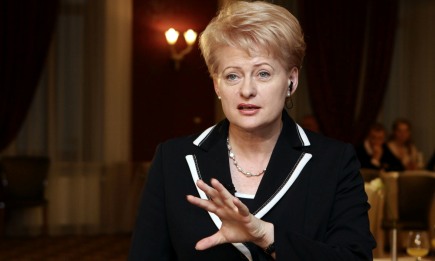Social sciences serve well-being

President Dalia Grybauskaite opened an international conference ‘Horizons for Social Sciences and Humanities’. It is one of the events of Lithuania’s Presidency of the Council of the European Union.
According to President Grybauskaite, social sciences and humanities deliver knowledge and experience to address conflicts and achieve peace through negotiations, collaborative work and communication – not by force or arms. Studies in these sciences offer the people and society competences of communication and collaboration, a broad cultural outlook, and a humanistic approach to the world.
Answers to existential questions
“Man and society is the source of all and everything. It is therefore social sciences and humanities that allow us to better perceive ourselves and the surrounding environment, help find the answers to existential questions, as well as to understand our expectations and our own place in the world. Contribution by representatives of social sciences and humanities is important to our well-being as their ideas and enthusiasm build a road to a modern and strong Europe,” Lithuanian President Dalia Grybauskaite said.
The conference will include key aspects of promoting higher education in Europe and the role social sciences and humanities should play in implementing the strategic framework Horizon 2020.
As important as natural sciences
Recently the humanities and social sciences received much more attention, in particular by the League of European research Universities (LERU). In a new advice paper LERU suggests ways in which the EU’s research programme Horizon 2020 can ensure that social sciences and humanities research is properly represented.
The Research Universities argue how and why this research is essential if Europe and the world are to solve major societal challenges such as ageing populations, food security, clean energy, smart transport or adaptation to climate change.
“The insights of social sciences and humanities research are as important as natural-scientific and technological breakthroughs in coming up with innovations that will be useful to governments, companies and citizens. Moreover, it is crucial that these insights are taken on board not as an add-on but are inherently built in at the very start of research projects, from the formulation of the questions to be addressed all the way through to the end.”
Changing habits
The LERU paper contains seven chapters for each of the seven societal challenges in Horizon2020, setting out the major social sciences and humanities research perspectives that need to be addressed. For example, the paper explains how this research is needed to take into account, for example:
- socio-psychological factors and habits of modern life, if we are going to convince an ageing population to remain physically active and healthy;
- the forces that drive public opinion and the powerful informational and educational role of the arts and the media, if we want societies and individuals to moderate their energy consumption;
- people’s everyday habits, beliefs, working and commuting routines from a social and psychological perspective if we want to devise smarter and greener transport systems.
A separate chapter in the paper is devoted to across-the-board ethical issues that should be addressed in the societal challenges and other Horizon2020 research programmes. The paper ends with a call to launch a flagship research initiative aimed at building a resilient and dynamic Europe in a globalised world.
Meest Gelezen
Vrouwen houden universiteit draaiende, maar krijgen daarvoor geen waardering
Wederom intimidatie van journalisten door universiteit, nu in Delft
‘Burgerschapsonderwijs moet ook verplicht worden in hbo en wo’
Raad van State: laat taaltoets nog niet gelden voor hbo-opleidingen
Hbo-docent wil wel rolmodel zijn, maar niet eigen moreel kompas opdringen

